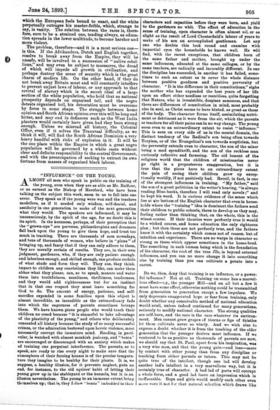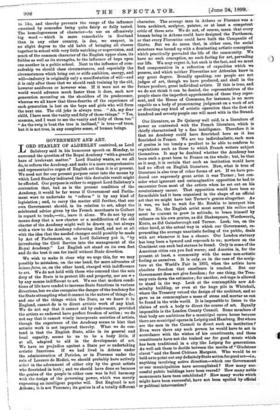"INFLUENCE " ON THE YOUNG.
ALMOST all men who speak in public on the training of the young, even when they are as able as Mr. Balfour, or as earnest as the Bishop of Hereford, who have been talking on the subject this week, seem to us to fall into one error. They speak as if the young were wax and the teachers modellers, as if it needed only wisdom, self-denial, and assiduity in one generation to make of the next generation what they would. The speakers are influenced, it may be unconsciously, by the spirit of the age, for no doubt this is its spirit. In the keenness, perhaps, of their perception that the "grown-ups " are perverse, philanthropists and dreamers fall back upon the young to give them hope, and trust too much in teaching. There are thousands of men nowadays, and tens of thousands of women, who believe in " plans " of bringing up, and fancy that if they can only adhere to them, they are morally certain of results. They are, in their own judgment, gardeners, who, if they are only patient enough. and laborious enough, and skilled enough, can produce orchids of what shade and form they will. They can, they think, impart to children any convictions they like, can make them abhor what they please, can, so to speak, manure and water them into truthfulness, manliness, thriftiness, tenderness, and they would add righteousness but for an instinct that in that one respect they must leave something for God to do. The amount of energy, patience, and self- sacrifice expended in some families upon this object is almost incredible, as incredible as the extraordinary fads into which the eagerness of parents sometimes betrays them. We have known pious people who would teach their children no creed because "it is shameful to take advantage of the plasticity of the young," and others who deliberately concealed all history because the study of so many successful crimes, or the admiration bestowed upon heroic violence, must necessarily corrupt the immature mind. Reading, in parti- cular, is watched with almost monkish jealousy, and " bents" are encouraged or discouraged with an anxiety which makes of training one perpetual interference. The parents, so to speak, are ready to rise every night to make sure that the atmosphere of their forcing houses is of the precise tempera- ture they imagine to be healthy for their plants. It is, we suppose, a healthy illusion, for it prevents neglect, puts an end, for instance, to the old squires' habit of letting their young grow up in the stableyard or the kennels, but it is an illusion nevertheless. The young to an immense extent bring themselves up ; that is, they follow " bents" imbedded in their oharacters and capacities before they were born, and yield to the gardeners no whit. The effect of education in the sense of training, upon character is often almost nil, or as slight as the result of Lord Chesterfield's labour of years to make of his son an accomplished gentleman. Let any one who doubts this look round and examine with impartial eyes the households he knows well. He will find, with the rarest exceptions, that children born of the same father and mother, brought up under the same influences, educated at the same colleges, or by the same teachers, are radically and incurably different. In one the discipline has succeeded, in another it has failed, some- times to such an extent as to cover the whole distance between positive goodness and positive perversity of character. " It is the difference in their constitutions," sighs the mother who has expended the best years of her life upon an effort either needless or resnitless, quite forgetting that Nature, who is irresistible, despises sameness, and that there are differences of constitution in mind, most probably also in soul, as Christ seems to have hinted, as great as those of the body. The character forms itself, assimilating nutri- ment or detriment as it were from the air, which the parents or teachers for all their pains can in no way change. The young seem even to an extraordinary extent to resist " influence." This is seen on every side of us in the mental domain, the distinct tendency of the Radical's son being often towards Toryism, or of the Evangelical's son towards scepticism, but the perversity extends even to character, the son of the miser being a mad spendthrift, and the son of the reckless man curiously reflective and farseeing. The old lament of the religious world that the children of missionaries never go right is a preposterous exaggeration, but it is true that the pious have to an extraordinary extent the pain of seeing their children grow up excep- tionally worldly, if not positively bad. Recoil, in fact, is one of the strongest influences in training. "My father," said the son of a great politician in the writer's hearing, "is always reading Blue-books, therefore I will read only novels ;" and he kept his word. It is curious evidence of the sense which lies at she bottom of the English character that even in house- holds where the " training " idea is dominant the fathers send their children to public schools, there to develop as they may, feeling rather than thinking that on the whole, this is the wisest course. If their theories were perfectly true it would be a wicked course, and home education the only righteous plan ; but then these are not perfectly true, and the fathers know it with the certainty which comes not of reason, but of intuition and experience. There are no warps in character so strong as those which appear sometimes in the home-bred. The something in each human being which is the foundation of his character, the root of the true Ille, is beyond external influences, and you can no more change it into something else by training than you can cultivate a potato into a carrot.
Do we, then, deny that training is an influence, or a power- ful influence ? Not at all. Training on some has a marvel- lous effect—e.g , the younger Mill—and on all but a few it must have some effect, otherwise nothing could be transmitted from generation to generation except a few impulses. We only deprecate exaggerated hope or fear from training, only doubt whether any conceivable method of national education would avail, unless indeed continued for many generations, seriously to modify national character. The strong qualities are self-born, and the race is the race whatever its environ- ment. Men cannot grow grapes of thorns or figs of thistles let them cultivate never so wisely. And we wish also to express a doubt whether it is from the teaching of the elder generation that the younger derives most influence. If we ventured to be as positive as thousands of parents are now, we should say that St. Paul, apart from his inspiration, was a very wise man, and that the young gain—and lose—more by contact with other young than from any discipline or teaching from either parents or tutors. This may not be quite true of the intellect, though one lad will develop another lad's intellect in a very marvellous way, but it is certainly true of character. A bad lad of parts will corrupt a whole form, and a good lad leave an impression which is ineffaceable. Boys and girls would modify each other even e were it nut for that natural selection which draws like
to like, and thereby prevents the range of the influence exercised by comrades being quite fairly or fully tested. The homologousness of character—to use an offensively big word — which is more remarkable in Scotland than in any other country, is due, we suspect, in no slight degree to the old habit of bringing all classes together in school with very little watching or supervision, and much of the common character of the English upper class, its foibles as well as its strengths, to the influence of boys upon one another in a public school. Next to the influence of com- radeship we should class circumstances, and especially the circumstances which bring out or stifle ambition, energy, and will—industry is originally only a manifestation of will—and it is only after these that we should rank training by the old, however assiduous or however wise. If it were not so the world would advance much faster than it does, each new generation mounting on the shoulders of its predecessor, whereas we all know that three-fourths of the experience of each generation is lost on the boys and girls who will form the next one. The old joke is always true. " Ah, my dear child, I have seen the vanity and folly of those things." " Yes, mamma, and I want to see the vanity and folly of them too." "As the twig is bent the tree is inclined," is true—of trees, but it is not true, in any complete sense, of human beings.



















































 Previous page
Previous page